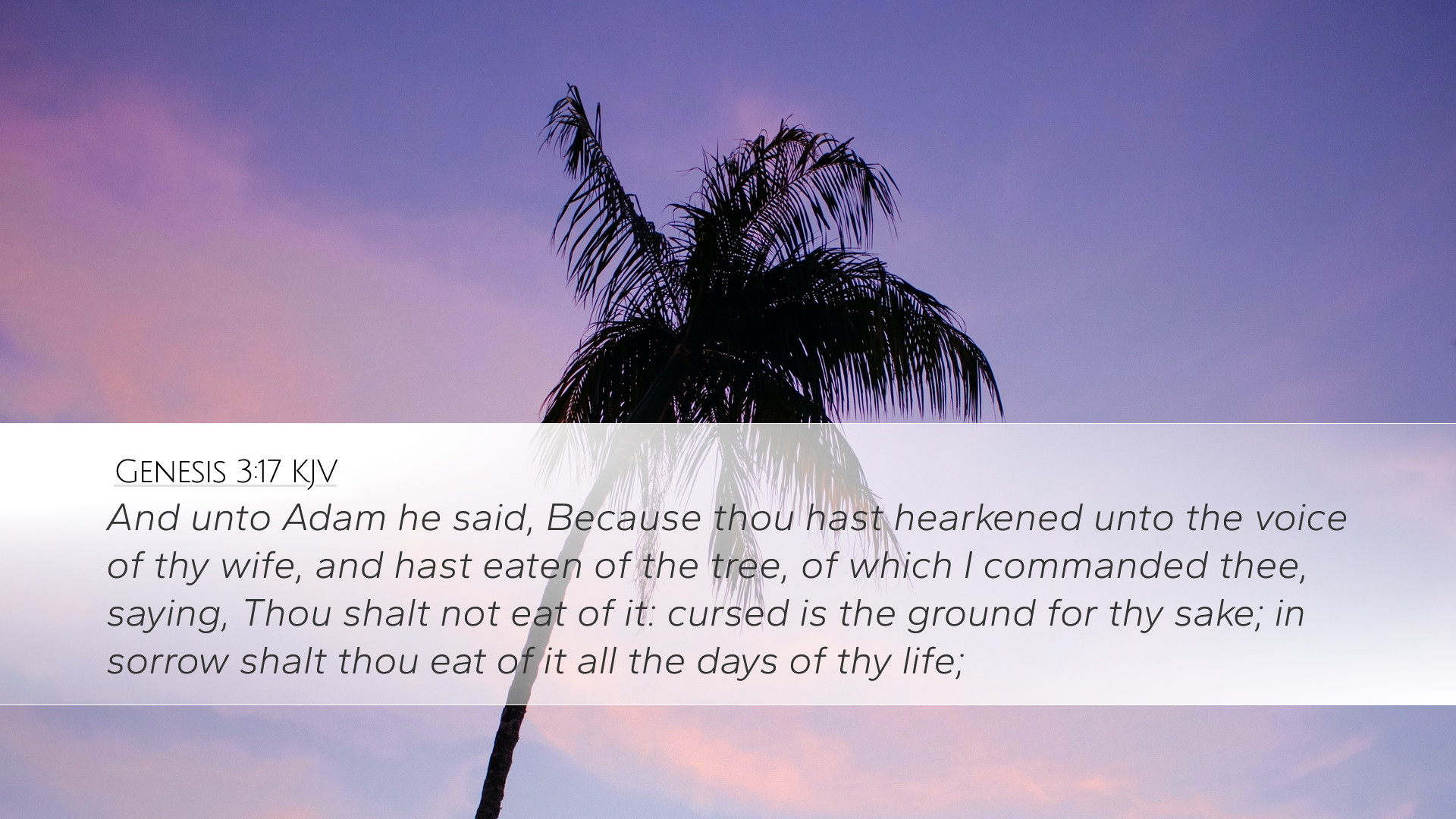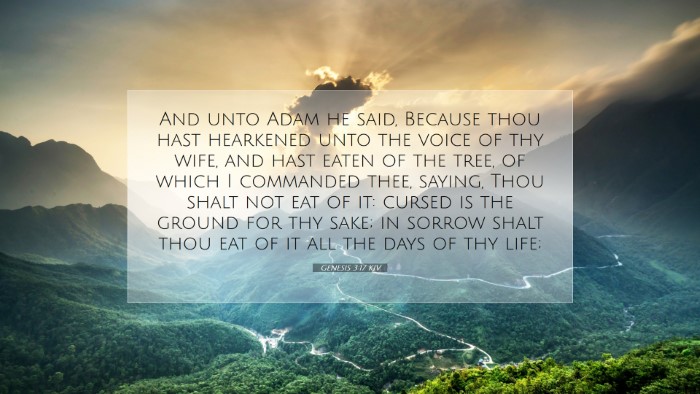Commentary on Genesis 3:17
Genesis 3:17 (KJV): "And unto Adam he said, Because thou hast hearkened unto the voice of thy wife, and hast eaten of the tree, of which I commanded thee, saying, Thou shalt not eat of it: cursed is the ground for thy sake; in sorrow shalt thou eat of it all the days of thy life."
Introduction
This pivotal verse marks a significant transition in the narrative of Genesis, encapsulating the consequences of Adam and Eve's disobedience. It reflects not only the immediate repercussions for Adam but also establishes a broader theological framework for understanding sin, human suffering, and divine judgment.
Contextual Analysis
In the context of Genesis chapter 3, God's declaration comes after the original sin, in which Adam and Eve ate from the forbidden tree. This moment represents humanity's first act of disobedience and introduces sin into the world. Eden was initially a place of harmony, but the act of crossing divine boundaries brings about God's judgment and a profound alteration in the relationship between humanity and creation.
Divine Judgment and Its Implications
According to Matthew Henry, the phrase "cursed is the ground for thy sake" is particularly significant. It illustrates that the very creation itself is affected by human sin. The ground, which previously yielded its fruit generously, is now cursed, indicating a cosmic scale of transformation and disruption. The relationship between humanity and the earth is set into conflict, suggesting that toil and hardship will now characterize existence.
The Role of Disobedience
Albert Barnes points out that the nature of Adam's disobedience plays a crucial role in understanding this passage. Adam was not led astray by external temptation alone but actively heeded the voice of his wife as opposed to obeying God's command. This underscores the theme of choice and accountability; Adam chose to prioritize human connection over divine authority, leading to dire consequences.
Analysis of Key Phrases
- "Because thou hast hearkened": This phrase emphasizes the volitional aspect of Adam's sin. It indicates that his choice was deliberate, signifying a failure to uphold God's word.
- "Cursed is the ground": This declaration reveals God’s sovereignty and the seriousness of sin. The earth, once a source of abundant life, is now subject to a curse, altering the fundamental relationship between humanity and creation.
- "In sorrow shalt thou eat of it": Adam is forewarned that his sustenance will come through pain and toil, a stark contrast to the effortless bounty of the Garden of Eden.
Theological Reflections
Adam Clarke elaborates that this cursing of the ground signifies a divine response to human sin but does not portray God as vengeful; rather, it serves to instruct humanity about the weight of disobedience. Clarke emphasizes that by introducing pain into Adam’s experience, God aims to draw him back to accountability and recognition of God’s commands.
Human Condition and Suffering
This verse has profound implications on the human experience of suffering. The sorrow that accompanies labor and production becomes a part of the human condition. As pastors and theologians engage with this text, it presents an opportunity to discuss the nature of work, suffering, and redemption in the broader context of salvation history. Creation is thus depicted as awaiting restoration—a theme that resonates throughout scripture and culminates in the New Testament's promise of restoration in Christ.
Hope Amidst Judgment
In light of judgment, there is an undercurrent of hope that scripture weaves throughout the narrative. The curse upon the ground invites reflection upon God’s grace and eventual plan for redemption through Jesus Christ. Understanding Genesis 3:17 in its fullness allows believers to appreciate the context of grace amidst the consequences of sin.
Conclusion
Genesis 3:17 symbolizes not just a moment of judgment but a turning point for the entirety of creation. Through this verse, pastors, students, and scholars are challenged to grapple with the complexities of sin's ramifications. The recognition of personal and corporate responsibility is crucial in understanding this text, as is the acknowledgment of God's redemptive plan that follows. This verse serves as a reminder of our need for grace and the promise of restoration awaiting in Christ.


